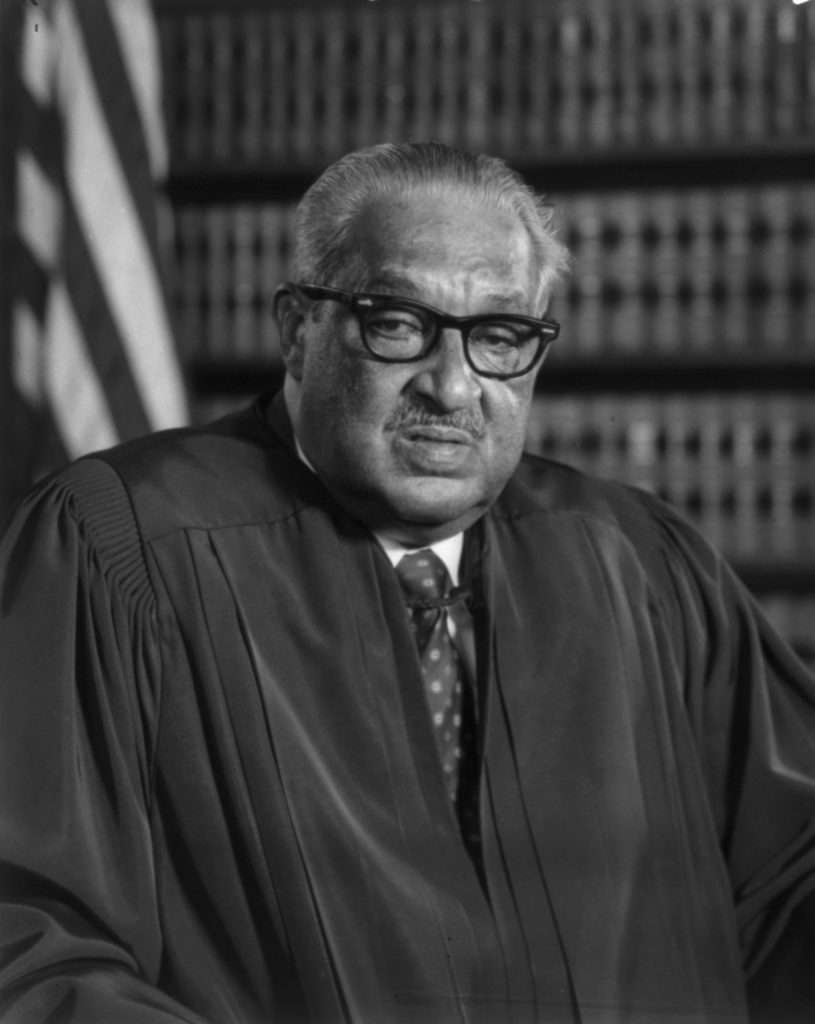The Volokh Conspiracy
Mostly law professors | Sometimes contrarian | Often libertarian | Always independent
Today in Supreme Court History: August 30, 1967
8/30/1967: Justice Thurgood Marshall takes the oath.

Editor's Note: We invite comments and request that they be civil and on-topic. We do not moderate or assume any responsibility for comments, which are owned by the readers who post them. Comments do not represent the views of Reason.com or Reason Foundation. We reserve the right to delete any comment for any reason at any time. Comments may only be edited within 5 minutes of posting. Report abuses.
Please to post comments


Wise v. Lipscomb, 434 U.S. 1329 (decided August 30, 1977): Powell stays Court of Appeals judgment rejecting reapportionment plan for electing Dallas City Council; plans submitted by legislatures (as opposed to plans ordered by a federal court) are entitled to some leeway and some at-large voting may be permissible; says good chance that cert would be granted (it was, and the Court agreed with Powell, 437 U.S. 535, 1978)
Dandridge v. Jefferson Parish School Board, 404 U.S. 1219 (decided August 30, 1971): Marshall, as you might expect, denies stay of desegregation plan; admits that changing from a dual to a unitary school system is difficult, but notes the “devastating, often irreparable injury to children who experience segregation and isolation” and cites the long list of Court desegregation decisions and notes that this Louisiana school district has been “mired in litigation for seven years”
Did he?
The first African-American to take the oaths of office as a Supreme Court Justice was Thurgood Marshall. Senior Associate Justice Hugo L. Black administered the Constitutional Oath to Marshall on September 1, 1967. The Clerk of the Court administered the Judicial Oath to Marshall in the Courtroom on October 2, 1967.
https://www.supremecourt.gov/about/oath/supremecourtoathfirstsandtrivia.aspx
What happened OTD was that he was confirmed.
https://www.history.com/this-day-in-history/day/august-30
Anyway, there were some orders handed down this week, including one that smoothed the way for an execution.
Checking, the most recent order OTD on the order page is this one:
THURSDAY, AUGUST 30, 2018
ORDER IN PENDING CASE
18A118 FULTON, SHARONELL, ET AL. V. PHILADELPHIA, PA, ET AL.
The application for injunctive relief presented to Justice
Alito and by him referred to the Court is denied.
Justice Thomas, Justice Alito, and Justice Gorsuch would
grant the application.
The Supreme Court eventually decided Fulton v. Philadelphia & Sharonell Fulton won her case though three justices wished the Court went further.
The first black federal judge was Thomas Hastie, appointed to the District Court of the Virgin Islands by President Roosevelt in 1937, serving in that position until his resignation in 1939. (The District Court of the Virgin Islands is not an Article III court, but an Article IV territorial court, and its judges do not have life tenure.) In 1949, President Truman would appoint Hastie to the Third Circuit, making him the first black federal appellate judge. There would not be another black federal appellate judge until President Kennedy appointed Thurgood Marshall to the Second Circuit i
n 1961, where he served in 1965.
In 1965, President Johnson convinced Marshall to step down from the bench to become his Solicitor General, with the at least tacit promise that he would appoint Marshall to the Supreme Court when a vacancy made it possible. This took a leap of faith from Marshall to step down from his life-tenured position, as there was no guarantee that, even assuming Johnson kept his word, that a vacancy would even arise. Johnson would eventually engineer a vacancy by appointing Ramsay Clark, son of Justice Tom Clark, as his Attorney General. (The conflict would have forced Justice Clark either to resign or else constantly recuse himself from cases.) Justice Clark resigned, and Johnson appointed Marshall to replace him.
Thanks, all true.
Reagan gets credit for appointing the first female Supreme Court Justice, but that is unfair. As can be seen, LBJ went to extraordinary lengths in 1967 to get a black person on the Court; at the time the "second wave" women's movement was barely getting started and women were still having trouble even getting into law school; and it wasn't until 1993 that another Democratic President got to appoint anyone at all.
There was some talk that Nixon would pick a woman.
He suggested Mildred Lillie, a state judge, but she was found unqualified by the ABA. Sylvia Bacon was also one of the names on his shortlist. Nixon appointed her to the D.C. Superior Court.
The talk helped to lead to the "First Monday In October" play and film, which concerned the first woman on the Supreme Court.
I saw that when it came out (the movie).
“Crap has a right to be crap.” — Walter Matthau, playing the William O. Douglas type, to Jill Clayburgh, playing the first woman Justice, discussing a First Amendment porn case
And not just any black jurist but Marshall, who at the time must have been the most hated lawyer in large swathes of the US,
10 of the 11 Senators who voted against Marshal's confirmation were DemoKKKrats as were 17 of the 20 who were "Not Voting" (They have one job, vote on Shit, and they couldn't even do that, and they weren't "Absent" just too big of Pussies not to make up their mind)
one of the "Not Voting" was George McGovern, see, he wasn't really such a great guy.
Frank
I am a bit unclear why it is "unfair." I realize you're trying to say he was the first with the opportunity to do so, but so what? He didn't have to do it, but he did it.
Name the only Senator who voted against both Thoroughly-Bad Marshall and Clarence “Frogman” Thomas, but Ironically never got the chance to vote for an Afro-Amurican Surpreme in 16 years of William Juffuhson and Barry Hussein
Frank
Robert Byrd